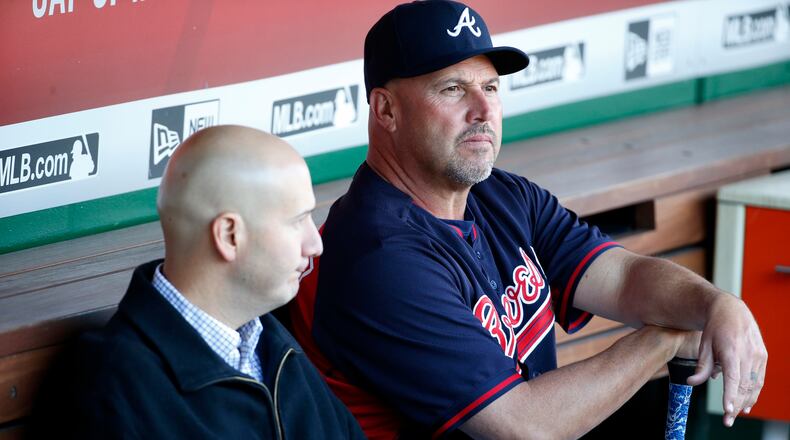This isn't getting better. The Atlanta Braves lost their first nine games. They've lost their past eight games. We say again: It's not yet May.
They're 4-17. Even the 1988 Braves, who started 0-10 and finished 54-106, were never 4-17. Even the 1962 Mets, who started 0-9 and finished 40-120, were never 4-17. (Both were 5-16.)
These Braves are now on pace -- apologies for bombarding you with this daily update, but I find it both fascinating and horrifying -- to win 31 games. (Actually 30.9.) That would mean losing 131. That would make them 11 losses worse than the worst team of the 20th Century and beyond. We're not just watching bad baseball. We're witnessing what could be historically bad baseball.
And that -- apologies for burying the lead -- is why you fire your manager.
I like Fredi Gonzalez a lot. He's a fine fellow and nowhere close to being the world's worst manager. He is, alas, stuck with what appears to be the world's worst team. The Minnesota Twins likewise started 0-9 but have won seven of 13 since. The Braves started 0-9 and are 4-8 since -- and that includes a four-game winning streak.
As mentioned in this space, the season's first nine days won't stand as Fredi G.'s finest managerial work. The Braves lost five games in which they led or were tied late. A good team can make up for early missteps. (It's a long season, as we know.) A bad team -- and these Braves always figured to be a bad team -- starts by losing close games and figures, "What's the use?"
Inevitably, those close losses become not-close losses. Only three of the Braves' first 12 losses came by four or more runs, and one was a game they led with two out in the eighth and nobody aboard. Three of the past five losses have been by four or more runs. The past two nights have seen them lose 11-4 and 9-4 to Boston.
On Tuesday they trailed 4-0 after half an inning. On Wednesday they trailed 6-1 after two innings. In such games, there's no managing to be done. If your starting pitcher is terrible, you have no chance unless you have a mighty offense, which the Braves manifestly do not. I'm not faulting Gonzalez for having lousy starting pitchers, but at some point changing the manager becomes less about the manager than about change.
At 4-17, the Braves have reached that point. It's one thing to lose 100 games. Houston did it three years running and made the playoffs two years later. (Then again, the Astros mightn't be the shining example of How To Rebuild, given that they're 7-15 after being tabbed the favorite in the American League West if not the American League.) It's something else to lose 115, especially if you're asking your fans, assuming any remain, to follow you to a different ballpark next year.
To rearrange the dynamics, the Braves have two choices. They could rush their lovingly assembled prospects to the majors, which is no choice at all. That would risk ruining the next five seasons to try to save one that's beyond saving. Or they could fire their manager and hope, possibly against hope, that a different voice in the clubhouse will have some positive effect.
(Whatever strengths Gonzalez has as a manager, arresting a slide isn't among them. His Braves were 9-18 in September 2011 and 7-18 in September 2014. They were 25-53 after July 7 last season.)
I'd expect that new voice to be an incumbent coach -- probably Eddie Perez but maybe Terry Pendleton or Bo Porter; Gwinnett manager Brian Snitker is another option -- as opposed to hiring Bud Black and telling him, "Clean up this mess." When you start 4-17, you're not looking for salvation. You're only hoping to limit the damage over the next five months.
Nobody in the organization wishes Fredi G. ill. Everyone concedes that he has been handed a substandard team. But still: It's a results-oriented business, and the Braves are 4-17 coming off the 25-53 dissolution of last season. What else is there to say?
The Braves could have fired Gonzalez at 0-9. Then they won their next four and the matter was tabled. Now they've made bookends of losing streaks, and doing nothing is no longer an option. They can't allow 4-17 to become 8-34. The schedule will ease eventually, but if the Braves have ceased trying it won't matter.
And that's why you fire your manager: Not because the next guy is sure to be Walter Alston but because he's guaranteed to be different. When you're 4-17, you have to try something else. Status quo is status broke.
Further grim reading:
A drop and a bullpen flop put a stop to the Braves' winning streak.
Progress! The Braves are giving us moments.
These Braves weren't built to win. Good thing, seeing that they're 0-5.
About the Author
The Latest
Featured



